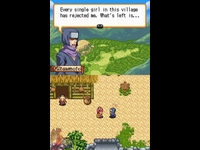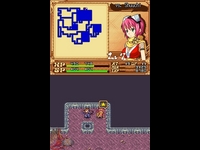|
|

|
BATTLE SYSTEM
|

|
INTERACTION
|

|
ORIGINALITY
|

|
STORY
|

|
MUSIC & SOUND
|

|
VISUALS
|

|
CHALLENGE
|
Easy but Punishing
|
COMPLETION TIME
|
Indeterminate
|
|
OVERALL
1.5/5
|
Rating definitions
|
|
|
"Dungeon Crawler" is a subgenre of role-playing games that feature deep dungeons filled with monsters, treasure, and a lone character who picks his way through, surviving on what little he may find. Izuna: Legend of the Unemployed Ninja is a variation on this theme with far-eastern style and a female protagonist, but unfortunately, it turns ninjutsu into drudgery.
As the title so blatantly suggests, Izuna is the story of an unemployed female ninja and her friends seeking work in a remote village. Upon seeing the village's shining sacred orb, the mischievous title character decides to steal it, even though the villagers told her a few minutes earlier to leave it alone. This angers the gods, for they despise having their shiny orbs molested, and they curse the entire village. It would be simpler to curse only the thieving brat, but that would make the story comprehendible. Izuna sets out to challenge each god, redeem herself, lift the curses, and shame every other female RPG character in history.
One of the selling points of Izuna is that the game supposedly has sparkling, humorous dialog. At first, Izuna's spunk is mildly amusing, but after a short time it becomes clear that she is little more than an irritating spoiled twit who puts a pistol to her head when she does not get her way. In sharp contrast, the other characters are terribly lackluster. Aside from some chuckle-worthy lines, the story fails to deliver an interesting experience, much less a largely amusing one.
 Cheer up! Rosie Palm is still available.
Cheer up! Rosie Palm is still available.
|
|
As in many dungeon crawlers of the "roguelike" strain, the protagonist and the monsters move at the same time in the randomly-generated dungeons of Izuna. If the player attacks, the monsters attack. Talismans, healing items, weapons, and ninja tools help the player survive. Talismans may bestow beneficial or detrimental effects on the character or the monsters, and they may also be affixed to weapons and armor as enhancements, creating nice custom pieces. The battle system is very simple, but each step requires care. Every element in the dungeons will eventually coalesce into disaster, usually one that causes the player to feel the rising urge to hurl his or her Nintendo DS, or at least the game cartridge, like a shuriken. This would not be due to a desire to act out a ninja fantasy, of course.
Traps, status effects, aggressive monsters, missed hits, and broken weaponry are not enough to ruin the day. Izuna heaps on the randomly generated misery by taking everything but levels away from the player upon death. No matter how much "real ultimate power" one may have, one cannot always elude this punishment. The game saves automatically upon entering a dungeon. Resetting after stumbling into a dire situation is an automatic loss. Bringing escape talismans is a rather clever idea, but those talismans are the ones most likely to be destroyed by annoyingly frequent fire traps. Barring that, the game creates many of situations in which one cannot use the escape talisman before being killed, typically after finding and extensively modifying a great weapon or piece of armor. In short, Izuna has plenty of bad luck and death.
 Ha ha, Shuuchi got owned by a girl!
Ha ha, Shuuchi got owned by a girl!
|
|
Interaction in Izuna is not too terrible, as the controls are easy to use and the mechanics are easy to grasp. This is most fortunate because at one point the in-game tutorial sensei actually tells the player to go read the manual. One aggravating feature is the limitation in saving. Once the player has entered a dungeon, he or she is trapped. The game may be quick-saved at the stairs of each floor, but one cannot shut the game off in the middle of a floor, as that is an automatic loss.
Aesthetically, Izuna has plenty of generic far-eastern flavor. The chunky graphics are somewhat cute and the colors are bright and cheerful, but they are nothing special and often appear as flat and superficial as RPGMaker graphics. Sound effects are neither outstanding nor horrible. The game's five hours of voice acting consists of brief, muffled Japanese voice clips, such as NPC greetings and Izuna's whining over status effects and hits. These are somewhat nice, but not too exciting. The music consists of uncreative, highly repetitive tunes with traditional Japanese instruments and riffs. At worst, one may want to turn down the volume on the DS; at best, one may experience a slight craving for cheap Japanese food.
Aside from basic strategizing, the game is rather simple to play. However, Izuna's twisted idea of challenge is heaping insurmountable misfortune on the player. Players may derive amusement from occasionally beating the system, but typically, in a Soviet twist, the system beats you. Completion time is hard to determine, as there is no in-game clock and variations in luck will drastically alter playtime. There are only six normal dungeons, but deaths and retries are frequent and unforgiving. Two long bonus dungeons remain after the ridiculous excuse for an ending, but the real challenge is figuring out why anyone would want to keep playing.
Astute RPGamers should not be fooled by Izuna's mesmerizing ninjutsu. There are better dungeon crawlers out there. Izuna has occasional humor and colorful anime-style graphics, but it also has punishing game conditions, a boring story, an annoying lead character, and virtually no innovation to the rehashed dungeon crawler subgenre beyond adding a ninja theme. Short of morbid curiosity or an Atlus fetish, there is no reason to touch this game.
Review Archives
|









